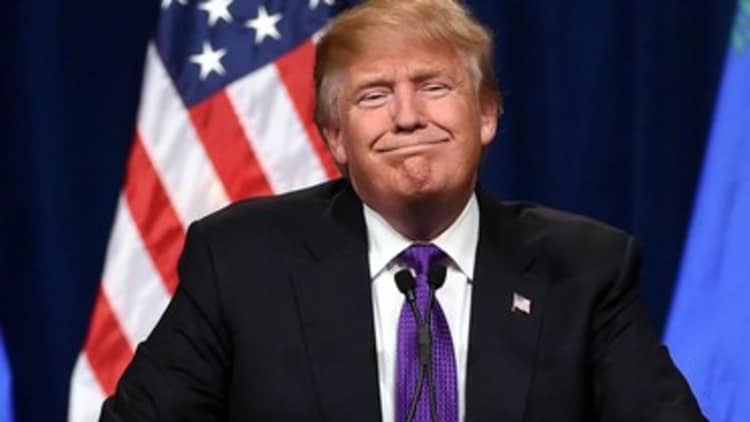
When Donald Trump announced his run for president last June, he also managed to promote his book, his real estate and his golf courses, which he said are "some of the best in the world."
If he becomes president, Trump would continue to have the ability to own and promote his multitude of businesses — even though some of those business interests are politically sensitive.
Ethics lawyers and presidential law experts say that despite a thicket of rules governing business interests in the executive branch, there is no rule that would prevent Trump from owning or promoting The Trump Organization if he's elected.
While Trump has said he might turn over day-to-day management to his children, he has not ruled out retaining his ownership stake or board seats in his multibillion-dollar global brand empire.
"There's really nothing in the law to prevent him from keeping his business," said Kenneth Gross, a partner at Skadden, Arps, Slate, Meagher & Flom who has advised several wealthy presidential candidates, Cabinet members and presidential appointees on navigating the ethics rules. "He would have to walk a very fine line and he [would] constantly have to be concerned about these issues. But he could keep it."
A spokeswoman for Trump's campaign did not return CNBC's calls or emails for comment. But Trump's campaign manager, Corey Lewandowski, told The Associated Press in January that "Running the country is clearly what Mr. Trump wants to do."
"Should he have the privilege of being elected president, he will be spending 110 percent of his time on that," Lewandowski told the AP.
Of course, this isn't the first time a wealthy candidate has run for president. Ross Perot, Steve Forbes and Mitt Romney all had to grapple with making sure their personal wealth holdings wouldn't conflict with their desire to sit in the Oval Office.
Yet most candidates or Cabinet members place their companies or investments in a blind trust, or sell their businesses and convert their holdings into cash or generic financial investments such as index funds or Treasurys. Romney, for instance, placed his hundreds of millions of investments and complex private equity investments into a blind trust.
President Barack Obama has his investments primarily in index funds with Vanguard and U.S. Treasurys. The Clintons liquidated their holdings to cash before Hillary Clinton's run in 2008, according to news reports.
Yet Trump's case is far more complicated. Since his businesses are private companies built around his brand and name, they can't easily be liquidated or temporarily turned into cash. Placing them into a blind trust is also futile, experts say, because Trump has been so intimately involved in the day-to-day operations and knows all of the major holdings.
"That would be like requiring him to have amnesia," Gross said. "You can't blind trust assets that you already know so well."
Rules around the president's financial dealings are complicated and governed by the U.S. Office of Government Ethics and U.S. criminal law. Under the basic criminal conflict of interest statute, employees of the executive branch cannot participate "personally and substantially" in a government matter that could affect their own financial interest or the financial interests of their spouse, minor children or a company that they own or have a partnership in. Yet the president and vice president are largely exempt from those rules.
There are some clear guidelines Trump would have to follow if he retained his companies. For instance, he can't seek government contracts or government licenses for his businesses. And he can't, for instance, turn his private 757 into Air Force One. He would also have to adhere to strict rules regarding gifts and anything seen as a "quid pro quo" for his company, according to ethics attorneys.
Still, legally, Trump could be CEO and commander in chief. And some say the difficulty of extracting himself from his business interests could pose a potential conflict.
One possible model for Trump's business dealings as president would be Michael Bloomberg. Before becoming mayor of New York, Bloomberg retained his majority ownership stake in Bloomberg LP, but vowed to remove himself from day-to-day operations and only weigh in on major company decisions. He also donated the Bloomberg terminals that were being used by the city to prevent appearances of a conflict, according to Gross, who helped structure the agreement.
"That was a very complicated agreement," Gross said. "We worked very closely with the city's Conflicts of Interest Board."
So far, Trump hasn't said whether he's working on a similar structure. And his statements on his plans for the company have been vague. When recently addressing questions about the future of his business on Fox Business News, Trump said: "I'm very proud of my company... I know I built a very great company. But if I become president, I couldn't care less about my company. It's peanuts."
He added that "I would probably have my children run it with my executives and I wouldn't ever be involved."
Still, Trump as both CEO and commander in chief would face a minefield of ethics issues. The Trump Organization is mainly focused on the U.S. and has interests in hotels, condo projects and entertainment businesses. Yet he also has projects or agreements in Turkey, Dubai, South Korea, Mexico and Panama.
Experts say the laws governing the president's business dealings weren't written with someone like the globe-stretching Trump in mind. And some say that no matter how Trump tries to structure his companies if he's elected, there could be conflicts.
"Most Americans would be surprised to learn that our core conflict of interest laws don't apply to the presidency," said John Wonderlich, policy director of the Sunlight Foundation, which advocates for more transparency and accountability in government.
"Conflicts of interest and divestment practices are much more likely to come into focus during this election. Even if candidates pledge to police their own corporate conflicts, the legal protections that most voters would assume already exist are unfortunately absent for the presidency."




